Search results
Projects
The Future of Museum Audiences I
Social Media, Digital Wayfaring and Museum Audiences
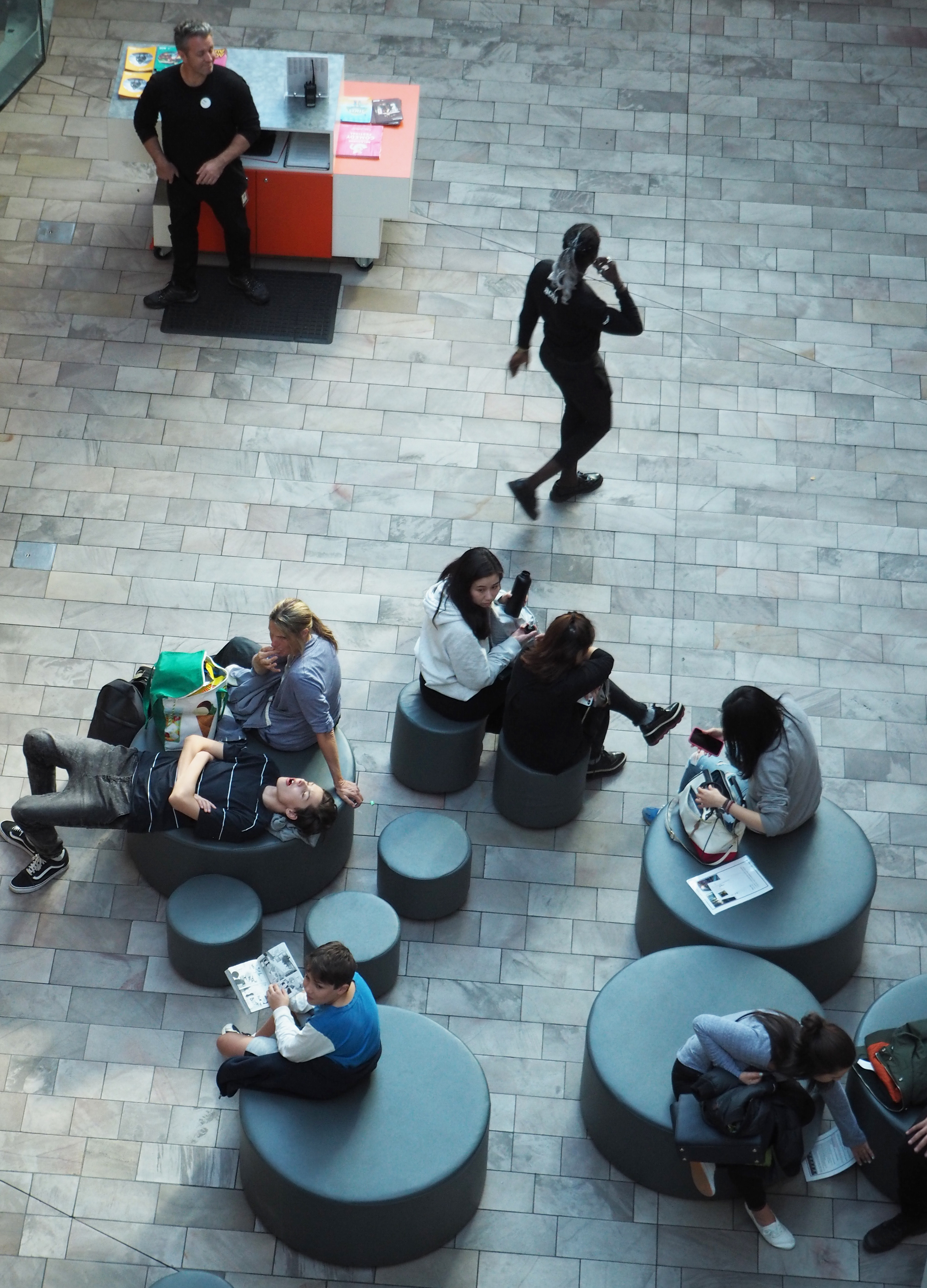
This project explored how museums can engage with social media platforms beyond the blunt instrumentalization of hashtags, likes and follows, to co-create and co-future inventive and responsive engagements with and for diverse and intergenerational museum audiences. Deploying the notion of digital wayfaring that acknowledges that digital, social and material worlds are interconnected, the project used ethnographic techniques in the context of the Australian Centre for the Moving Image (ACMI). Ethnography provides insight into practice and lived experience — dynamic processes that big data can’t address.
If you would like to get involved with this project, fill out the form below or reach out to project leaders via the contact info provided alongside each bio.
People
Larissa Hjorth
Distinguished Professor and Director, Design and Creative Practice
School: Enabling Capability Platforms
Larissa Hjorth is a digital ethnographer, artist, Distinguished Professor and director of the Design & Creative Practice ECP platform at RMIT University. With Professor Heather Horst, she co-founded the Digital Ethnography Research Centre (DERC). Previously, Hjorth was Deputy Dean, Research & Innovation, in the School of Media & Communication (2013−2016). Hjorth served on the inaugural Australian Research Council (ARC) Engagement & Impact Pilot study assessment panel for humanities and creative practice.
Hjorth studies the socio-cultural dimensions of mobile media and play practices in the Asia-Pacific region with an emphasis on interdisciplinary, collaborative and cross-cultural approaches. She has published a dozen co-authored books, edited over a dozen Handbooks/Companions and has over 40 journal articles.
More recently, Hjorth’s work has become concerned with how we can bring creative, social and design solutions to the growing ageing populations and, in turn, how we might consider scenarios of what it means to die well. She is also studying how our “more-than-human” companions can teach us about new media in everyday life. Hjorth’s last book, Haunting Hands (Oxford Uni Press) looked at how mobile media is being deployed in situations of grief and trauma, her previous book explored how art practice can teach us new acumen into the climate change debate.
Hjorth’s books include Haunting Hands (with Cumiskey 2017), Screen Ecologies (with Pink, Sharp & Williams 2016), Digital Ethnography (Pink et al. 2016) Mobile Media in the Asia-Pacific (2009), Games & Gaming (2010), Online@AsiaPacific (with Arnold 2013), Understanding Social Media (with Hinton 2013), and Gaming in Locative, Social and Mobile Media (with Richardson 2014).
Jacina Leong
PhD candidate
School: Media and Communication
Jacina Leong is an artist-curator and PhD candidate in the School of Media and Communications, RMIT. Her research explores critical-creative and careful curatorial approaches to social innovation practices by museums and galleries.
Over the past decade, she has worked in hybrid new media spaces, universities, national and international festivals, regional museums and galleries, libraries and schools — to vision and deliver a diverse range of trans-disciplinary engagement programs, via highly collaborative, experimental and site-responsive processes. Most recently, Jacina was curator for Robotronica, project lead and founding member of the Guerrilla Knowledge Unit, guest facilitator of the Future Innovators Summit (Ars Electronica Tokyo Initiative), and co-curator of the provocation, Curating In The Age of Automation (RMIT & Ritsumeikan University, Kyoto).
From 2012 to 2017, Jacina worked at The Cube (QUT), establishing the inaugural STEAM engagement program for school and university students, educators and pre-service teachers. This program involved key collaborations with local, national and international organisations including Ars Electronica, LEGO Education, and Brisbane City Council. She has also worked in public program development at the Ipswich Art Gallery, collaborative learning strategy in universities, gallery management at Jan Murphy Gallery, and was advisor to the inaugural Make Nice at VIVID Festival.
The Future of Museum Audiences II
Museum Engagement, Data and Older Audiences
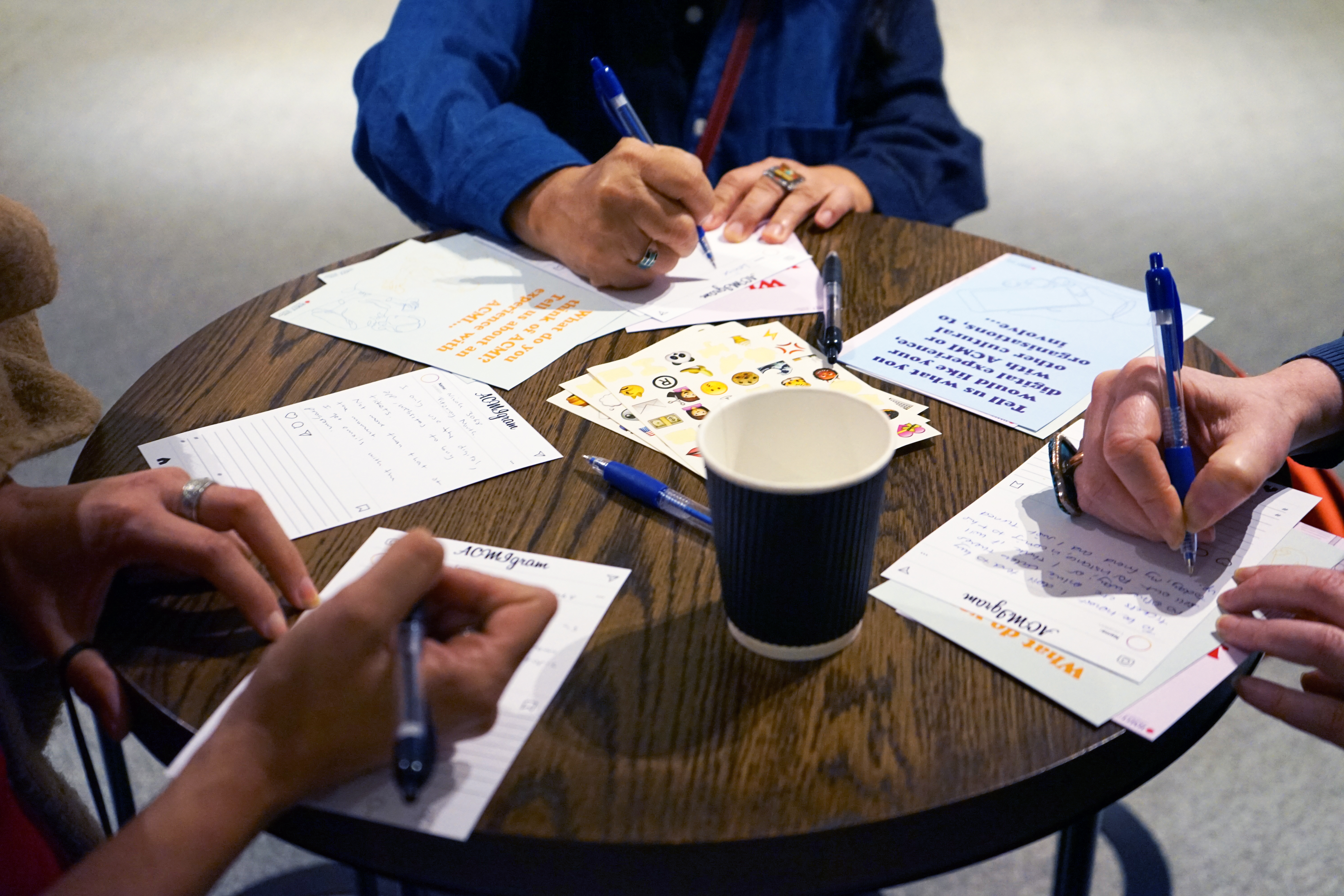
Building on Phase 1, this project specifically sought to identify and develop socially thick understandings of the (digital and non-digital) experiences and potential opportunities for older adults in the museum sector.
Using a series of postcards aimed at discursive elaboration, we invited audiences to share cups of tea and biscuits as they wrote and discussed their responses. We engaged these audiences to ethnographically and creatively reflect upon how they view the museum as an institution, as a place for belonging, and what they would like their digital (and non-digital) experiences with the museum to involve.
If you would like to get involved with this project, fill out the form below or reach out to project leaders via the contact info provided alongside each bio.
People
Larissa Hjorth
Distinguished Professor and Director, Design and Creative Practice
School: Enabling Capability Platforms
Larissa Hjorth is a digital ethnographer, artist, Distinguished Professor and director of the Design & Creative Practice ECP platform at RMIT University. With Professor Heather Horst, she co-founded the Digital Ethnography Research Centre (DERC). Previously, Hjorth was Deputy Dean, Research & Innovation, in the School of Media & Communication (2013−2016). Hjorth served on the inaugural Australian Research Council (ARC) Engagement & Impact Pilot study assessment panel for humanities and creative practice.
Hjorth studies the socio-cultural dimensions of mobile media and play practices in the Asia-Pacific region with an emphasis on interdisciplinary, collaborative and cross-cultural approaches. She has published a dozen co-authored books, edited over a dozen Handbooks/Companions and has over 40 journal articles.
More recently, Hjorth’s work has become concerned with how we can bring creative, social and design solutions to the growing ageing populations and, in turn, how we might consider scenarios of what it means to die well. She is also studying how our “more-than-human” companions can teach us about new media in everyday life. Hjorth’s last book, Haunting Hands (Oxford Uni Press) looked at how mobile media is being deployed in situations of grief and trauma, her previous book explored how art practice can teach us new acumen into the climate change debate.
Hjorth’s books include Haunting Hands (with Cumiskey 2017), Screen Ecologies (with Pink, Sharp & Williams 2016), Digital Ethnography (Pink et al. 2016) Mobile Media in the Asia-Pacific (2009), Games & Gaming (2010), Online@AsiaPacific (with Arnold 2013), Understanding Social Media (with Hinton 2013), and Gaming in Locative, Social and Mobile Media (with Richardson 2014).
Hugh Davies
Postdoctoral Research Fellow
School: Games
Hugh Davies is an artist, curator and researcher of games and play. His practice explores histories of media devices and cultures of games in the Asia Pacific Region. Awarded a PhD in Art, Design and Architecture from Monash University in 2014, Hugh’s studies in game cultures have been supported with fellowships from Tokyo Art and Space, M+ Museum of Visual Culture and the Hong Kong Design Trust. Hugh is currently a postdoctoral research fellow at RMIT in Melbourne, Australia.
Jacina Leong
PhD candidate
School: Media and Communication
Jacina Leong is an artist-curator and PhD candidate in the School of Media and Communications, RMIT. Her research explores critical-creative and careful curatorial approaches to social innovation practices by museums and galleries.
Over the past decade, she has worked in hybrid new media spaces, universities, national and international festivals, regional museums and galleries, libraries and schools — to vision and deliver a diverse range of trans-disciplinary engagement programs, via highly collaborative, experimental and site-responsive processes. Most recently, Jacina was curator for Robotronica, project lead and founding member of the Guerrilla Knowledge Unit, guest facilitator of the Future Innovators Summit (Ars Electronica Tokyo Initiative), and co-curator of the provocation, Curating In The Age of Automation (RMIT & Ritsumeikan University, Kyoto).
From 2012 to 2017, Jacina worked at The Cube (QUT), establishing the inaugural STEAM engagement program for school and university students, educators and pre-service teachers. This program involved key collaborations with local, national and international organisations including Ars Electronica, LEGO Education, and Brisbane City Council. She has also worked in public program development at the Ipswich Art Gallery, collaborative learning strategy in universities, gallery management at Jan Murphy Gallery, and was advisor to the inaugural Make Nice at VIVID Festival.
Gretchen Coombs
Post Doctoral Research Fellow
School: Design and Creative Practice
Gretchen Coombs is a Post Doctoral Research Fellow in the Design & Creative Practice Enabling Capability Platform at RMIT. She researches socially engaged art practices in the US, the UK and Australia, with a particular focus on how they are practiced in urban contexts. She’s a core member of the Cultural Value and Impact Network (CVIN) and contributes to Creative Care in the School of Art. Gretchen has a PhD in social and cultural anthropology and a MA in visual criticism: her writing uses a combination of ethnographic methods and visual analysis. She is a co-author of Creative Practice Ethnographies (Rowan & Littlefield 2019) and her monograph, The Lure of the Social: Encounters with Contemporary Artists (Intellect 2021 ) is an experimental ethnography about contemporary artists working at the intersection of art, aesthetics, and politics.
Playable City Melbourne
Making the City a Platform for Play
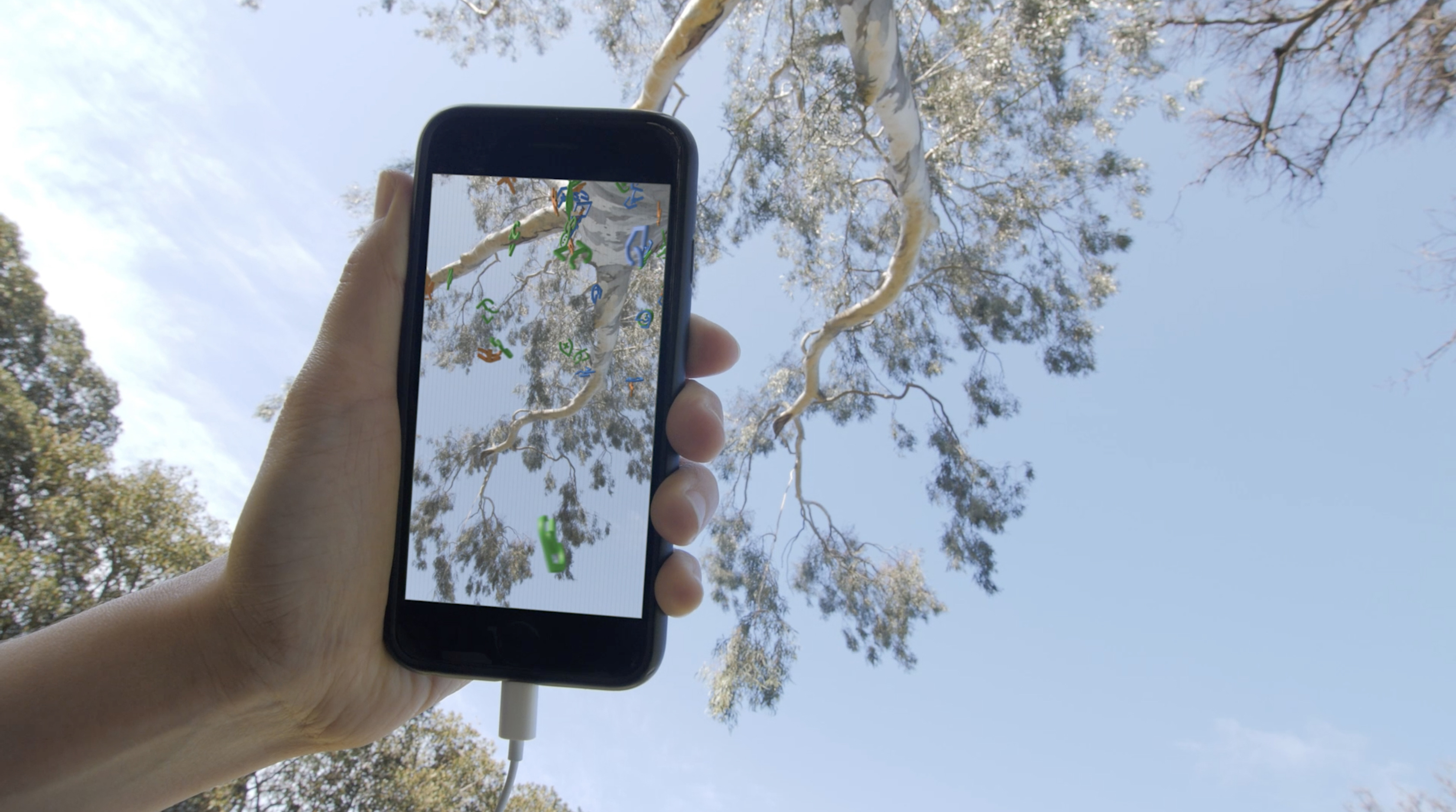
Playable cities connect people and place through creative technologies, making the city a platform for play. Playable City Melbourne is a three-year project bringing together an interdisciplinary urban play community.
During Melbourne International Games Week 2019, Playable City Melbourne is calling for a diverse community of designers, game developers, scientists, writers, architects, artists, producers, performers, players, bureaucrats etc to learn more about urban play and join in the conversation. This conference will explore other ways of being in public space, First Peoples connection to place, and more-than-human infrastructure. Playable City Melbourne talks to the city’s multi-layered civic identity – as a creative city, technological city, a diverse and multicultural city, knowledge city and liveable city that is growing fast.
If you would like to get involved with this project, fill out the form below or reach out to project leaders via the contact info provided alongside each bio.
People
Troy Innocent
VC Research Fellow
School: School of Design
Dr Troy Innocent is an artist, academic, designer, coder, educator, and VC Senior Research Fellow at RMIT University, where his creative practice research explores the city as platform for play through an inventive blend of live art, game design and public art. Over the past ten years he has explored the lived experience of cities through mixed realities; situating his work in Melbourne, Bristol, Barcelona, Istanbul, Ogaki, Sydney and Hong Kong. As Melbourne Knowledge Fellow, Innocent expanded his ‘urban codemaking’ practice for situating play in cities to develop Playable City Melbourne, a three-year project bringing together an interdisciplinary urban play community. He is currently artistic director of 64 Ways of Being, a playable city-wide platform for augmented reality experiences supported by a Creative State Commission.
Audience Lab
Exploring the future of audiences and engagement in an age of big data and social media
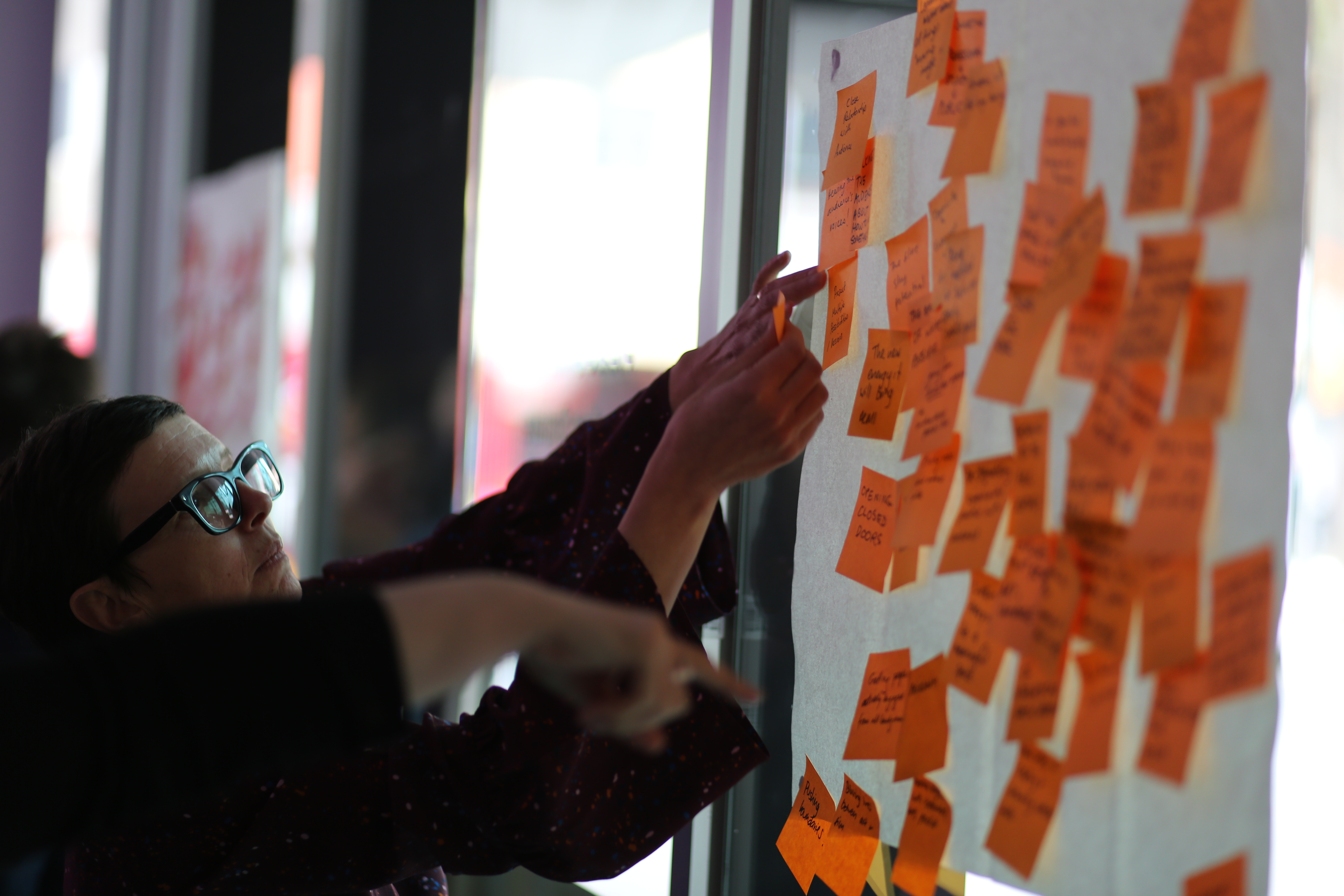
Cultural organisations — galleries, museums, archives and libraries — are designing new ways to engage with the public. Audience Lab brings together these institutional players with industry and academia to discuss the collaborative possibilities of a publicly-facing product testing ground for new ideas. Our focus lies in developing a Lab where industry can user-test ideas, publics can be introduced to the technologies employed in contemporary media creation and academics can interlace between both, to explore the larger questions facing the future of design and media.
If you would like to get involved with this project, fill out the form below or reach out to project leaders via the contact info provided alongside each bio.
People
Martyn Hook
Dean
School: Architecture and Urban Design
Dr Martyn Hook is Deputy Pro Vice-Chancellor Partnerships in the College of Design and Social Context at RMIT University in Melbourne, Australia. He also holds the position of Dean at RMIT’s School of Architecture & Design alongside his role as Professor of Architecture. In addition to his work at RMIT Martyn is a director of multi award winning iredale pedersen hook architects, a studio practice based in Melbourne and Perth dedicated to appropriate design of effective sustainable buildings with a responsible environmental and social agenda.
Hook has particular expertise in the implementation of strategic vision in creative practice and driving organisational change through the lens of an integrated scholarship model that links teaching and research. Prior to this appointment he was Acting Dean of the School of Architecture & Design and Acting Head of the School of Art.
News and updates
No results
People
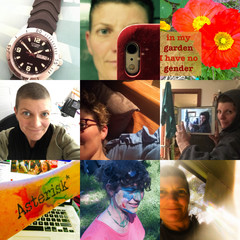
Son Vivienne is a Post-Doctoral Researcher at Creative Agency and the Digital Ethnography Research Centre at RMIT. Their principal expertise is digital self-representation, online activism, queer identity, and rhetorical strategies/feminist practices for speaking and listening across difference. Son is also involved in community development and arts as an activist, workshop facilitator and media-maker. Son is author of Digital Identity and Everyday Activism: Sharing Private Stories with Networked Publics (Palgrave Macmillan) and co-author/co-editor of Negotiating Digital Citizenship: Control, Contest, Culture (Rowman & Littlefield).
Son curates several collective storytelling websites for queer and gender-diverse communities and has over twenty years of multi-media production and distribution experience. As an award winning writer/director/producer of drama and documentaries, they tackled subjects as diverse as youth suicide; drug cultures in Vietnamese communities; and lesbian personal columns. Their film work includes multi-lingual (Vietnamese-English and Adnyamathanha-English) and multi-modal (animation, micro-docs, digital storytelling and interactive web-platforms) projects that reflect their comparative, cross-cultural and critical approaches to communication and storytelling.
Zoe is an urban designer and lecturer working at the Australian Urban Design Research Centre (AUDRC), part of the School of Design at the University of Western Australia, where she teaches in the Master of Urban Design. She has led and participated in research projects and design communication for local and State government on topics such as the challenges, perceptions, and spatial issues relating to medium density housing and transit-oriented development, implications of river and sea-level rise for cities, and co-design strategies for urban renewal. Zoe has over 15 years’ experience across the private, public, and tertiary sectors, in project management, policy and planning, and senior strategic communications, including experience in statutory planning, strategic planning policy, and legislative and parliamentary processes. She sits on the City of Vincent Environmental Advisory Group, which has overseen projects such as drain conversion into public park space. Zoe’s current research at AUDRC is focused on how evidence-based urban design can enhance mental health and restoration through connection to nature in our cities, and the remaking of overlooked spaces and hard infrastructure as ecologically and emotionally regenerative places. She is the author of Wildness and Wellbeing: Nature, Neuroscience and Urban Design (Palgrave Macmillan).
Dr Zoe Myers is the team leader for Haptic Pathways, the finalist for the 2019 DCP Design Challenge.
